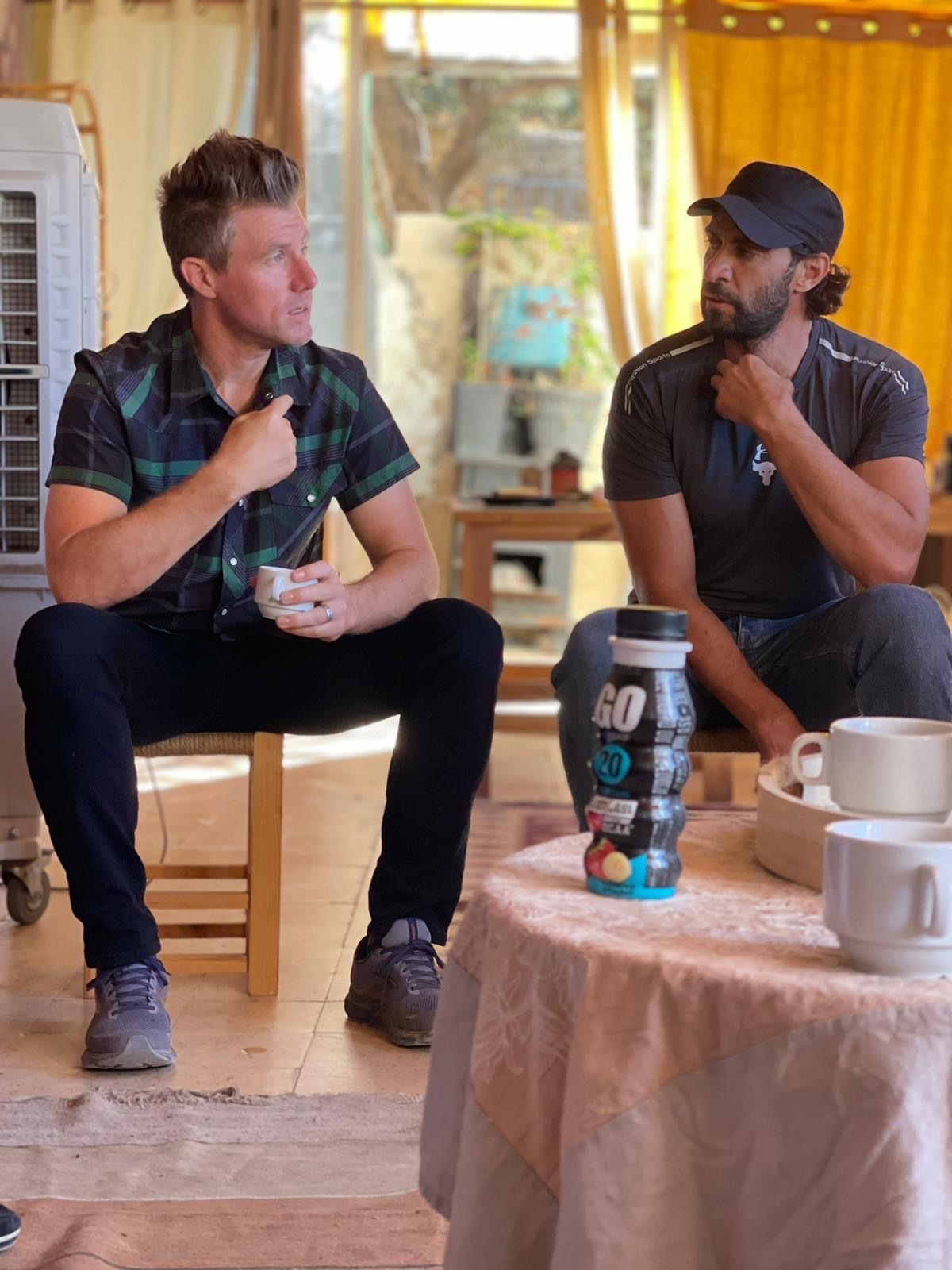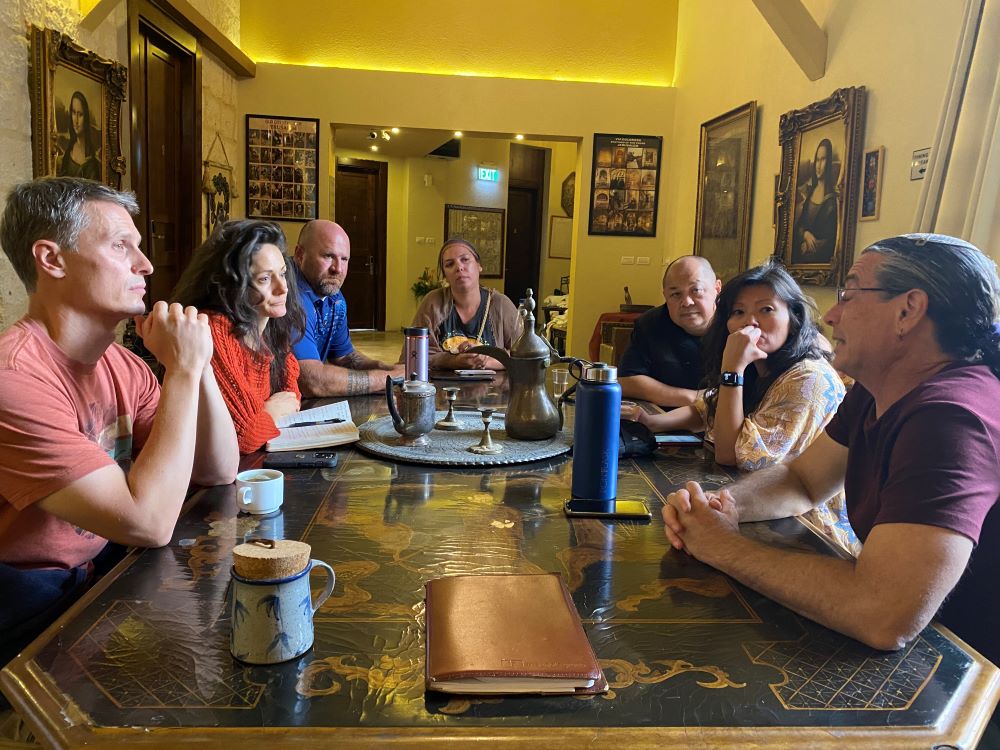One week ago, I evacuated from Israel. While there, I was outraged by the terror inflicted upon Israelis by Hamas’ insurgents. I witnessed, firsthand, the ripples of violence in the aftermath of their attack. I spent time in bomb shelters with Israelis, Palestinians, and internationals who were caught within and trying to make sense of this escalation. Proximate to the pain, we all held our breath while we worked to deepen our understanding and expand our empathy.
The experience of generosity of spirit that I shared in the shelters collided with my concern over how leading voices in US American evangelicalism would position their commentary on this crisis.
The day I returned home, Christianity Today’s Russell Moore published an article, “‘Bothsideism’ About Hamas is a Moral Failure.” In it, he argued the immorality of suggesting that Hamas’ surprise attack was both deplorable and justified. I identified with his moral outrage and joined him in condemning the immorality of Hamas’ violence against the vulnerable.
I am also outraged by the onesideism of his argument. In overemphasizing Hamas alone as responsible for the “killing and destroying of both Israelis and Palestinians,” identifying Hamas alone as “genocidally evil,” and willfully ignoring, even rejecting, the necessity of context, Moore has reinforced dangerous stereotypes that further dehumanize and are lethal to Palestinians.
I join Moore in his outrage over that moment of horror and lament its impact on our Jewish kin. The Jewish people have survived centuries of displacement, lethal discrimination, and genocide – making the fear and trauma of this attack permeate their collective consciousnesses in a way that is incomprehensible for most of us outside their community. And, I am equally outraged by the decades-long, systematic violence being done to Palestinian citizens, especially those in Gaza, by a militarized occupation. This violence is now being expedited into unthinkable horror that some are identifying as a next genocide.
I agree that the “bothsideism” that Moore argues against is a moral failure. And, there is another bothsideism that is morally responsible: while Hamas’ violence is deplorable it was also predictable, because we know that violent ideologies and terrorism emerge in the face of oppression that does not seem insurmountable. That is not to say that this violent attack is inevitable, because we also see the majority of Palestinians who have chosen the path of peace and nonviolence, even in the face of violent oppression.
That being said, allow me to suggest two omissions from Moore’s thought piece that, if included, may have offered some perspective desperately needed among American evangelicals today.

Omission #1: The Context. My life’s work takes me into war zones. Whether on battlefields or in boardrooms, I help leaders become peacemakers who navigate conflict. The crisis in Israel and Palestine is a space that I have been immersed within for over twelve years. Within this conflict, I have learned that the escalation of violence is never an isolated event. It always occurs within context. If we cannot understand each others’ pain and our contributions to it, then we will defend our own pain and use it to justify our violence. If we cannot acknowledge that another’s pain is as true as ours, we will fight to prove the severity of our own pain and enact violence to even the scales.
Acknowledging the larger context of violence is essential and not equivalent to condoning it.
In Moore’s article, he not only argues against the need for context, he isolates Hamas’ commitment to “genocidal evil” and minimizes it as the sole justification for the violence Palestinians now suffer. In so doing, he fails to acknowledge the more than fifty years of violence enacted upon Palestinian citizens in Gaza by Israel’s militarized occupation that gave rise to such an ideology. Further, Moore neglects to acknowledge how that same militarized occupation has done damage to Israel’s own psyche and soul. With a more responsible understanding of the context of this crisis, perhaps Moore could have deepened our understanding of how the underlying fears, grief, and trauma of power brokers on both sides have birthed this moment of senseless violence.

Omission #2: The Gospel. I would expect an article written on any topic by a leading US American evangelical theologian to point us to the good news of Jesus Christ. As I read, I anticipated Moore reminding us of the God of mercy who got proximate to our pain not with wrath but in relationship. I expected him to reveal the God who made peace and forged a new family out of former enemies not through military overthrow and political power, but through self-sacrifice. We needed him to call us, especially in this moment of crisis, to follow Jesus in reaching for the hand of our other and enemy rather than power.
Sadly, Jesus’ name was never invoked. The Jesus who built a new community that transcended societal boundaries and borders was absent from his writing. The good news of our enemy-loving, cross-wearing God who is actively making all things new (Rev. 21:5) was never mentioned. In a moment when we needed hope, we received a message that reinforced stereotypes and replicated oppressor/oppressed binaries that will cost the lives of many. His musings carry the potential of reinforcing the lies that to be Christian is to be pro-Israel rather than pro-human. That Palestinians and Hamas are terrorists one in the same. And that a proper Christian response to this war is to offer unequivocal support for Israel to eliminate Hamas by any means necessary.
One week ago, I stood in the courtyard of the Church of the Holy Sepulchre in Jerusalem, the place of crucifixion, burial, and resurrection, while air raid sirens blared, and rockets detonated in the air above me. In no other moment in my life have I become more convinced that the enemy-loving, violence-absorbing, interdependent Way of Jesus is the way forward. In this moment of crisis, and in those to come, Jesus needs to be lifted up as our model for how we live, love, and lead and, for how we work to bring violence to an end.
A Way Toward a Deeper, More Nuanced Understanding: From within this crisis, there are Palestinian and Israeli peacemakers, Muslim, Jewish, and Christian, who are working tirelessly to ensure that all within their wingspan survive this terror. They’re not writing thought pieces from within the confines of safety…they’re waging peace from within the trenches of a war. They are actively de-escalating conflict, providing humanitarian care, strengthening friendships across boundaries, and, if they survive, preparing to rebuild a world no longer divided by difference, fear, and trauma. Regardless of their tradition, they are embodying the hopeful alternative to violence and we at Global Immersion are committed to amplifying their stories on our channels as this war unfolds. We would all do well to listen to them longer than feels comfortable. To allow their perspectives to interrogate our own and expand the reach of our empathy. To heed their plea to leverage all of our power and privilege to bring an immediate end to this horror.
For now, listen to the words of Palestinian Christian peacemaker, Daoud Nasser, when asked what he thinks will contribute most to ending this violence. He said, “When we follow the Jesus we talk about, this crisis will be over.”

This piece was originally published in Red Letter Christians.
Dr. Jer Swigart is the Co-founder and Executive Director of Global Immersion. He’s the co-author of Mending the Divides: Creative Love in a Conflicted World (IVP, 2017), and a speaker, mediator, facilitator, and coach who reflects on the intersection of faith, leadership, conflict, and peacemaking. He has reflected on his recent experience in Israel and Palestine with Shane Claiborne while in Jerusalem and, more recently on Global Immersion’s Everyday Peacemaking Podcast.

